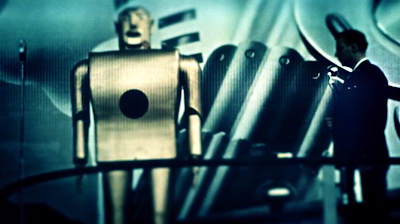Donna Harraway - we are all cyborgs. We are all reliant on technology, and ultimately, we all define ourselves through technology. And the thing that makes us fundamentally human is not simply our species, but the ways in which we are totally reliant on technology
How is Anita an example of a cyborg?
Anita is creepy, and even unpleasant. This is because she occupies something we refer to as the 'uncanny valley'. This is further exaggerated though the casting of Gemma Chan as Anita. She is so hegemonically attractive that she is even potentially uncomfortable for the audience. She is a highly unrealistic standard of beauty, that is emphasised through mise-en-scene such as her makeup and the highly flattering lighting that constructs her.
Judith Butler and gender performativity
Sex - biological distinction, male, female, intersex etc
Gender - the category that somebody identifies as
Gender performance - the aspects of the gender stereotypes that we choose to conform to
Gender performativity - how our gender performance affects the world around us, and constructs the world around us
Example question: Judith Butler argues that gender is a performative act, and that gender performativity is essential in fundamentally constructing the world around us. Evaluate this theory of representation. Make reference to Humans to support your answer.
How does Anita's gender performativity shape the world around her?
Anita is a gendered cyborg. She is constructed by her gendered identity. It heavily inferred that she is able to have sex and she is sexually available. She has long hair, breasts, is wearing makeup, and has feminine features that construct her as a hegemonically sexually attractive woman.
Sophie - is obsessed with the idea of Anita being pretty, and is visibly excited when Anita is revealed to be pretty. She says 'yay!' Anita conforms to societal norms, and Sophie is delighted that she has a pretty doll to play with.
Joe - is clearly excited by the sexual prospects of Anita. He hides his nervousness by talking in a stereotypically manly way, perhaps to impress Anita? Or perhaps to distract himself from the guilt he is feeling? A high angled close shows both Anita and Sophie walking away, constructing a polysemic mode of address, where Joe is concerned by Anita walking off with with Sophie, but also looking at her backside. Later in the episode, a close up shot of Joe inspecting the 18 plus card functions as a hermeneutic code. Will Joe have sex with Anita? And how will this affect his relationship? It also introduces a powerful question to the audience: does having sex with a robot count as cheating? These questions help to engage the audience, while exploring issues of gender. Additionally, Anita is wearing a particularly innocent and sexless blue dress, that does not accentuate her body at all
Mattie - "what's your max processing speed?"
Toby - Toby is absolutely obsessed by Anita's sexual potential. This is encoded through the MES of Toby licking his, and a slow zoom on his face, which anchors this gesture
Laura - Feels as though she is being replaced by Anita, both sexually, and in terms of being a a mother. Because she appears to lack emotional engagement, however, she can never fully commit to these roles.
Constructing an argument
The representation of gender in Humans is highly complicated, in order to both entertain it's science fiction fan target audience, but also to ask important questions about what it means to be a woman, and what it means to be a Human. Potentially, the producers of Humans are presenting a deliberately controversial and exploitive representation of women. Far from being feminist, it is instead being deliberately sexist, and hiding behind the idea of robots as allegory. Themes such as rape, slavery, racism and sexism are all chucked in with little thought, to create an exciting mode of address for the target audience.

